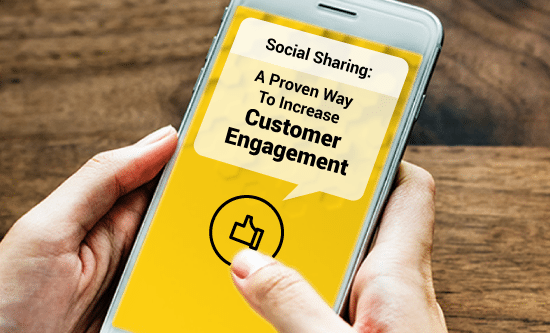As the name suggests, ‘social sharing’ refers to the act of social media users sharing specific web content with friends, colleagues or family members.
This can be done over almost any platform including email, Facebook, Instagram, WhatsApp or even Snapchat! For example, say you signed up to the mailing list of an international hotel chain. As part of a promotional drive, you receive an email with a time-limited discount for 50% off your next hotel stay. With the offer sounding too good to keep all to yourself, you decide to share it via Twitter to 500 of your closest friends, relatives and followers. This act of passing on information is what is commonly referred to as ‘social sharing’.
While providing customers with social sharing opportunities is remarkably straightforward, ensuring that it is actually used is something different altogether. In order to guarantee the success of any marketing campaign that includes social sharing functions, it is imperative to have clear and concise “call-to-action”:
- Share content within their own social networks;
- Like specific content on social media pages; and
- Follow the brand on social media.
However, in order to be really successful, it’s necessary to understand what motivates people to share information in the first place. According to NY Times study “The Psychology of Sharing, Why do People Share Online”, 78% of people share information online as a way to feel connected to other people.
For others, they share information as a way to receive social recognition (also known as social currency) from their peers or online community. Interestingly, researchers into the topic claim that about 62% of people feel significantly better about themselves when they receive positive reactions to posts they’ve made online.
What is social currency?
As humans, there is nothing we love more than talking about our lives, our interests, and our achievements. In his famous book Contagious, Jonah Berger states that almost 40% of everyday human interactions revolve around us talking about ourselves. For online communication, that percentage skyrockets to nearly 80%!
When it comes to building our social currency, not only do we have a tendency to talk about ourselves, but we also have a tendency to avoid topics that may appear mundane or commonplace. Instead, we opt for things that are exciting, ‘remarkable’, extraordinary or unusual.
For example, if we share knowledge about a ‘top-secret’ pop-up sale, we will be seen by others as someone with insider knowledge – a definite boon when it comes to our social status.
Why social sharing is important for marketers and how to make the most of it.
As with most marketing tools, social sharing is primarily used as a mechanism to bolster customer engagement and increase the chance of sales conversions. Yet many marketers still don’t put much effort into social sharing.
If you’re not making it easy for your customers to share your content or have it incorporated within your communications, you should consider:
- Increasing organic reach by leveraging your customer’s own networks;
- Expanding engagement through trusted networks of friends and family;
- Creating content that is recommended and shared by others;
- Identifying and utilising social media influencers;
- Including sharing options to boost overall brand awareness.
Whether you’re trying to promote a hotel business or life insurance, social sharing is one of the most popular and flexible tools in every marketers’ toolbox. If used properly – i.e. by taking into account the reasons why your customers share and which social platforms they use– you’ll soon be on your way to seeing increased engagement, more conversions, and a growing customer base.
Want to learn more about building customers’ trust online? Check out our article on Social Proof.
 By Kitty Shui, Data-driven Strategy Specialist at Digital Alchemy.
By Kitty Shui, Data-driven Strategy Specialist at Digital Alchemy.
[pardot-form id=”46577″ title=”Blog Sign up test1″]
